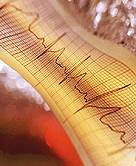
WEDNESDAY, May 15 (HealthDay News) — Among young heart attack victims, women often have more medical issues, more chest pain and worse quality of life before the event than men, a new study reveals.
The researchers, from the Yale School of Medicine, said young women also tend to have worse mental health with more physical limitations prior to their heart attacks.
The findings could help explain why young women often have worse outcomes than their male peers after a heart attack, said the researchers, who concluded that doctors should regularly assess young women’s heart attack risk.
“Compared with young men, women under 55 are less likely to have heart attacks,” study author Rachel Dreyer, a research fellow in cardiovascular medicine at Yale, said in an American Heart Association news release. “But when they do occur, women are more likely to have medical problems, poorer physical and mental functioning, more chest pain and a poorer quality of life in the month leading up to their heart attack.”
The study involved nearly 3,000 women and men, aged 18 to 55, who participated in an international study of heart attack patients. The researchers questioned the participants to assess their chest pain and quality of life before their heart attack.
The study also revealed that the women were more likely than the men to have other conditions linked to heart disease, such as diabetes: 40 percent of women compared to just 27 percent of the men. Moreover, 55 percent of the women were obese, compared to 48 percent of the men.
Of the women, 6 percent had a history of stroke and 6 percent had heart failure. In contrast, 3 percent of men had a history of stroke, and 2 percent had heart failure. Meanwhile, 13 percent of women had renal failure and 49 percent suffered from depression. The researchers said only 9 percent of men had renal failure and just 24 percent were depressed.
“These data suggest that young women were suffering more from their heart disease than young men prior to their heart attack,” Dreyer said.
“We need to develop better methods for recognizing and treating young women with chest pain to optimize their quality of life and potentially even prevent a heart attack,” Dreyer said in the news release.
“General health and disease-specific health-status assessments are valuable tools for health care providers to measure the burden of disease on patients,” she said. “These should be standardized into clinical practice, much like assessments for other traditional heart disease risk factors.”
The study findings were scheduled to be presented Wednesday at the American Heart Association annual meeting in Baltimore. The data and conclusions of research presented at medical meetings should be viewed as preliminary until published in a peer-reviewed journal.
More information
The U.S. Centers for Disease Control and Prevention has more about women and heart disease.

